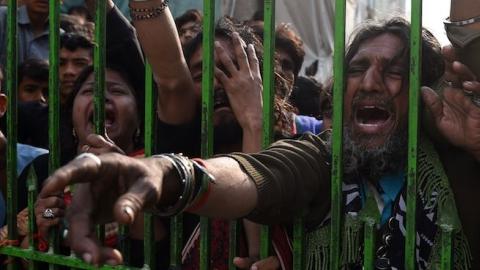The suicide bombing at the Sufi shrine of Lal Shahbaz Qalandar at Sehwan is not the first terrorist attack on a place of worship in Pakistan, and is unlikely to be the last. Imbued with their extremist ideology, jihadis have targeted several Sufi shrines all over Pakistan for several years. As the shrine is a major attraction for devotees, the Sehwan attack resulted in a very high number of fatalities, just like the attacks on the popular shrine of Data Ganj Bakhsh in Lahore in 2010 and that of Hazrat Shah Noorani in Balochistan last November. Unfortunately, Pakistan’s ruling elite still sees terrorism through a geo-strategic lens, not as the consequence of its appeasement and sponsorship of Islamist extremism.
Jihadi justification
The jihadis justify their violence against Sufi shrines as attacks against ‘impure’ manifestations of the Islamic faith. Killing ‘unbelievers,’ ‘heretics’ and ‘deviants’ is an integral part of their plan to create a purer Islamic state. The same justification has been used in the past to attack Shias and Ahmadis as well as Pakistan’s Christians and Hindus. Although jihadi groups were originally nurtured by Pakistan for proxy wars in Afghanistan and against India, at least some jihadi groups consider Pakistanis as legitimate targets. To them Pakistan is as much their religious battlefield as Afghanistan or India. Pakistan would have to delegitimate the jihadi ideology in its entirety to ensure that more extreme offshoots of its protégés do not kill its people.
Despite periodic noises about making no distinctions among good and bad jihadis, Pakistan’s leaders have shown no interest in defining all jihadis as a threat to Pakistan. The country’s military still sees terrorism in the context of its geo-strategic vision. The jihadis responsible for attacks within Pakistan are deemed ‘agents’ of Indian intelligence or the Afghanistan National Directorate of Security (NDS).
For Pakistan’s military, Pakistan has only one enemy and all acts of violence against Pakistanis must be attributed only to that enemy. At a recent event in Washington DC, I was confronted by a fellow Pakistani who argued that terrorism in South Asia would end if the Kashmir issue was resolved in accordance with Pakistan’s wishes. He had no answer to my question how resolution of any international dispute would diminish the fanaticism of those who kill Shias and Sufis as part of an effort to purify Muslim society.
In all four provinces
Over the last week, jihadi offshoots claiming links to the Islamic State (IS) have demonstrated their capacity to strike in each one of Pakistan’s four provinces. Jamaat-ul-Ahrar, a faction of the Taliban, publicly claimed responsibility for some of the attacks and threatened to attack further Shia, Ahmadi and Pakistan military targets as part of its ‘Operation Ghazi’. Simple research on Jamaat-ul-Ahrar and other similar groups reveals that their members are homegrown Punjabi jihadis ideologically convinced of their narrow sectarian worldview.
But Pakistan’s reaction to the Sehwan attack was to blame groups ‘based in Afghanistan’. Some were silly enough to suggest that the latest wave of attacks was aimed at preventing the Pakistan Super League (which plays its cricket in Dubai due to poor security in Pakistan) from having its final in Pakistan. There was no attempt to answer the question how Afghanistan-based terrorists could travel vast distances within Pakistan without being intercepted by Pakistan’s security services. After all, the Inter-Services Intelligence (ISI), which prides itself at being the ‘world’s best intelligence’ service, shows a high degree of efficiency in dealing with secular critics, ranging from little known bloggers to political activists, but is remarkably incompetent at interdicting suicide bombers.
The only reasonable explanation for why Pakistan is unable to intercept jihadi terrorists targeting its own people is that the state apparatus does not consider jihadis as the enemy in the same manner as they pursue secular Baloch and Muhajir political activists or other critics of Pakistan’s policies.
For decades Pakistan has seen jihadi groups as levers of its foreign and security policy and periodic assertions that the policy has changed have proved wrong. Every step against jihadis is followed by one in the opposite direction. Thus, the much publicised ‘Operation Zarb-e-Azb’ targeted out-of-control Pakistani Taliban in Waziristan but spared groups based in Punjab and Karachi. Hafiz Saeed’s recent detention was accompanied by blocking action against him and Masood Azhar at the U.N. with Chinese support. It is almost as if the Pakistani state is continuously telling jihadis, “Those of you who do not attack inside Pakistan will not get hurt.”
More about image
For Pakistan’s civil and military elite, the priority is Pakistan’s international image and its external relations, not the elimination of terrorism or confronting extremist ideology. Pakistan’s publicly stated view of its terrorist problem is that it is the victim of blowback from its involvement in the anti-Soviet Afghan Jihad during the 1980s. Former military ruler, General Pervez Musharraf, described Hafiz Saeed as Pakistan’s hero in a well-known interview on Pakistan’s Dunya TV in October 2015 and argued that Pakistan had “brought Mujahideen from around the world” and “trained the Taliban” at a time when Afghan warlord Jalaluddin Haqqani and Osama bin Laden were heroes for both the CIA and the Pakistanis.
In this version of history, there is little acknowledgement of Pakistan’s role in allowing the ideology of jihad to flourish and grow for two decades after the Soviets withdrew from Afghanistan and the Americans started telling Pakistan to shut down the jihadi enterprise. Pakistanis spend more energy defending themselves against U.S. and Indian criticism over safe havens for the Afghan Taliban than they do on figuring out how to rid Pakistan of the cancer of jihadi terrorism.
Twenty-five years have elapsed since then Secretary of State James Baker threatened Pakistan in 1992 that its support of jihadi groups could result in the U.S. declaring Pakistan a State Sponsor of Terrorism.
Over a quarter century, Pakistan has offered excuses and explanations as well as made promises that have not been kept. It has itself faced terrorism, lost lives and fought certain terrorist groups. But its essential policy of using jihadi groups for strategic advantage in the region— in Afghanistan, Jammu and Kashmir and against India — has not drastically changed.
For ‘strategic advantage’
In the process of securing strategic advantage, Pakistan has unleashed ideologically motivated groups on its soil that have morphed and mutated over time. While groups such as Hafiz Saeed’s Jamaat-ud-Dawa speak of Pakistan’s national interest, other groups such as Jamaat-ul-Ahrar have an ideological perspective that is not limited by the concept of modern nation states. For them, Pakistan is as dispensable as other states for the restoration of an Islamic caliphate and they have a God-given right to kill those they consider un-Islamic.
In a recent report co-authored by Lisa Curtis of the Heritage Foundation and myself, we pointed out that Pakistan must focus on reversing the extremist trends in Pakistani society. Pakistani authorities — specifically the country’s military leaders, who control its foreign and security policies — need to take a comprehensive approach to shutting down all Islamist militant groups that operate from Pakistani territory, not just those that attack the Pakistani state.
As attacks like the recent one in Sehwan demonstrate, Pakistan’s tolerance for terror groups undermines the country. It corrodes stability and civilian governance, damages the investment climate, and inflicts death and injury on thousands of innocent Pakistani citizens.
















